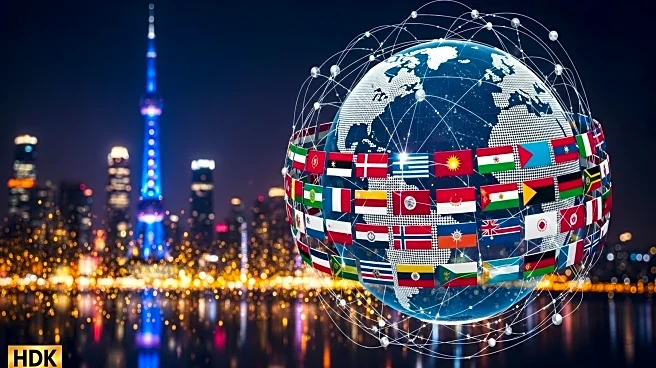What's Happening?
The Shanghai Cooperation Organization (SCO) summit, held in Tianjin, China, saw leaders from member countries, including Russian President Vladimir Putin and Indian Prime Minister Narendra Modi, gather to discuss strategies to counter U.S. influence in global affairs. Chinese President Xi Jinping announced plans to accelerate the creation of a development bank and establish an international platform for energy cooperation. The summit, originally a security forum aimed at countering U.S. influence in Central Asia, has expanded its scope and influence over the years. Xi introduced initiatives such as a cooperation platform for green and energy industries and pledged $1.4 billion in loans to SCO members over the next three years. Additionally, Xi opened the way for SCO member states to use China's BeiDou satellite system, an alternative to the U.S.-controlled GPS system. The summit also saw Laos join the SCO as a partner, increasing the group's reach to 27 countries.
Why It's Important?
The SCO summit represents a significant geopolitical shift as China, Russia, and other member states seek to establish a new world order that challenges U.S. dominance. The creation of a development bank and energy cooperation platform could enhance economic ties among member states, reducing reliance on Western financial systems. The use of China's BeiDou satellite system by SCO members further diminishes U.S. technological influence. This summit underscores the growing desire among these nations to form a more balanced global governance system, potentially leading to shifts in international alliances and economic partnerships. The expansion of the SCO's influence could impact U.S. foreign policy and economic interests, particularly in Central and Southeast Asia.
What's Next?
The SCO's initiatives may lead to increased collaboration among member states in areas such as economic development, energy cooperation, and technological integration. The development bank could provide financial support for infrastructure projects, fostering economic growth within the region. The use of the BeiDou satellite system may enhance communication and navigation capabilities for member states, reducing dependency on U.S. technology. As the SCO continues to expand its influence, the U.S. may need to reassess its foreign policy strategies in response to this emerging geopolitical challenge. The summit's outcomes could also influence future diplomatic and economic negotiations between the U.S. and SCO member countries.
Beyond the Headlines
The SCO's focus on rejecting Cold War mentality and promoting a multipolar world order highlights the ideological differences between its member states and the U.S. This shift could lead to long-term changes in global governance structures, with potential implications for international trade, security, and diplomatic relations. The emphasis on green and energy industries aligns with global efforts to address climate change, potentially fostering innovation and collaboration in sustainable technologies. The SCO's expansion and initiatives may also influence cultural and educational exchanges among member states, promoting greater understanding and cooperation across diverse regions.












